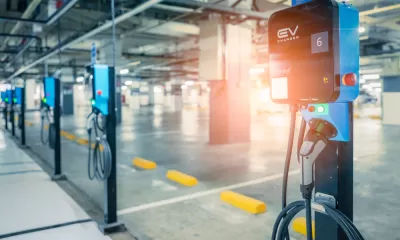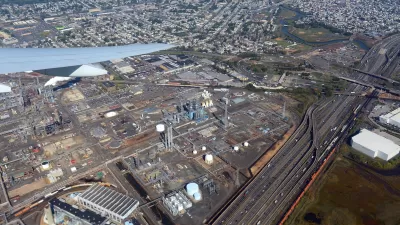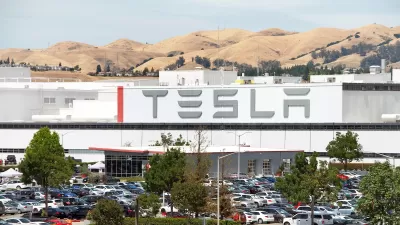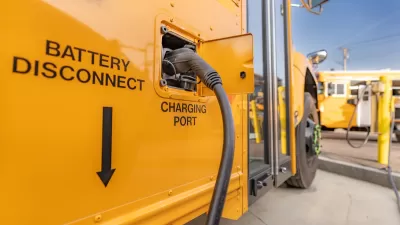While they emit less pollution, electric cars don’t solve many urgent issues like sprawl and fine particulate pollution.

A new analysis shows that even worldwide adoption of electric vehicles to replace gas-powered cars would not solve some major problems caused by auto-oriented infrastructure.
Writing in Bloomberg CityLab, Eric Roston explains that researchers surveyed roughly 400 papers to understand how the “substantial, ongoing investment” in physical and economic infrastructure that prioritizes cars harms public health and exacerbates climate change. “A comprehensive review published last month provides a litany of what the authors call ‘car harm,’ in estimated global totals of death, injury, disease and other miseries, over the course of automotive history.”
Meanwhile, electric cars don’t change underlying development patterns or how much space is allocated to cars. “Swapping engines for batteries isn’t changing how much cities pave themselves to accommodate cars, and or how cars kill people, the authors write. Although their tailpipes don’t spew carbon monoxide, they are often heavier than their internal-combustion counterparts, which means more fine-particle pollution from tires on highways.”
FULL STORY: EVs Can’t Fix a Global Epidemic of ‘Car Harm,’ Study Finds

Study: Maui’s Plan to Convert Vacation Rentals to Long-Term Housing Could Cause Nearly $1 Billion Economic Loss
The plan would reduce visitor accommodation by 25,% resulting in 1,900 jobs lost.

North Texas Transit Leaders Tout Benefits of TOD for Growing Region
At a summit focused on transit-oriented development, policymakers discussed how North Texas’ expanded light rail system can serve as a tool for economic growth.

Why Should We Subsidize Public Transportation?
Many public transit agencies face financial stress due to rising costs, declining fare revenue, and declining subsidies. Transit advocates must provide a strong business case for increasing public transit funding.

How to Make US Trains Faster
Changes to boarding platforms and a switch to electric trains could improve U.S. passenger rail service without the added cost of high-speed rail.

Columbia’s Revitalized ‘Loop’ Is a Hub for Local Entrepreneurs
A focus on small businesses is helping a commercial corridor in Columbia, Missouri thrive.

Invasive Insect Threatens Minnesota’s Ash Forests
The Emerald Ash Borer is a rapidly spreading invasive pest threatening Minnesota’s ash trees, and homeowners are encouraged to plant diverse replacement species, avoid moving ash firewood, and monitor for signs of infestation.
Urban Design for Planners 1: Software Tools
This six-course series explores essential urban design concepts using open source software and equips planners with the tools they need to participate fully in the urban design process.
Planning for Universal Design
Learn the tools for implementing Universal Design in planning regulations.
Ascent Environmental
Borough of Carlisle
Institute for Housing and Urban Development Studies (IHS)
City of Grandview
Harvard GSD Executive Education
Toledo-Lucas County Plan Commissions
Salt Lake City
NYU Wagner Graduate School of Public Service





























